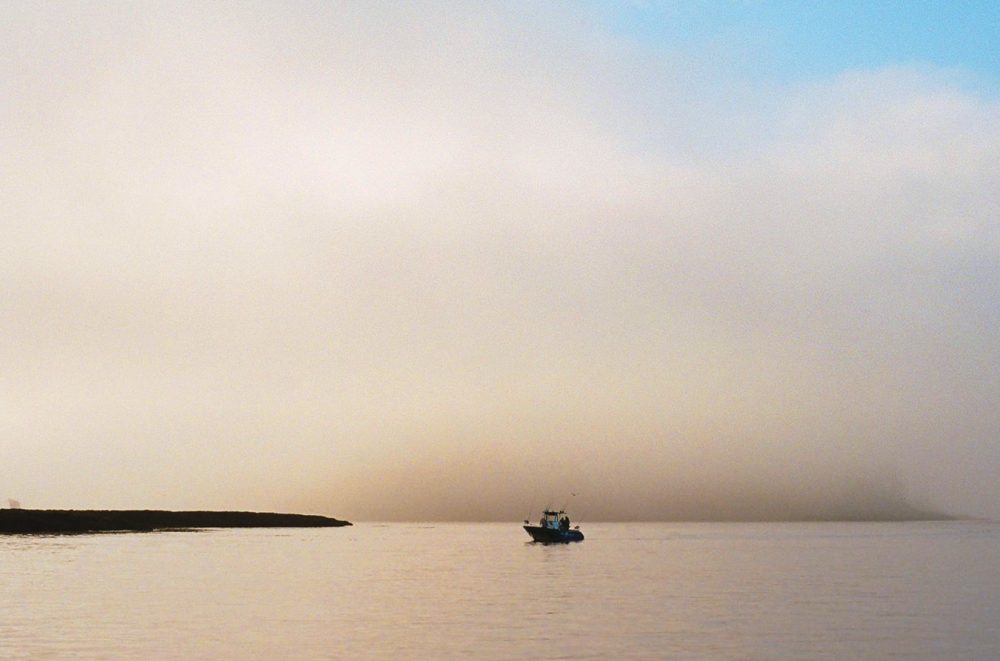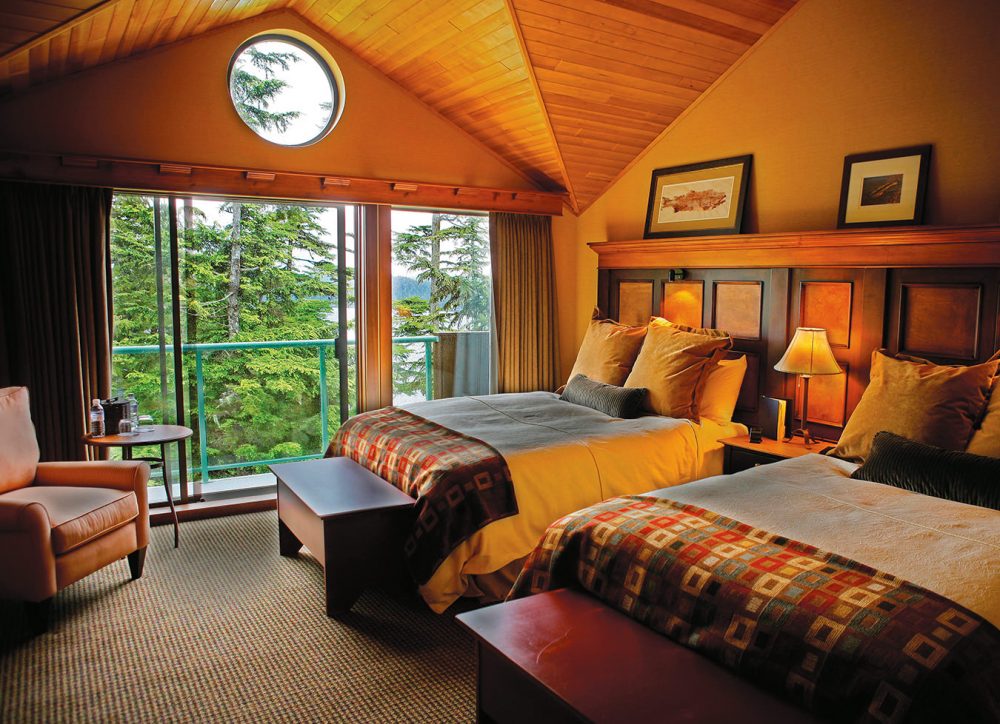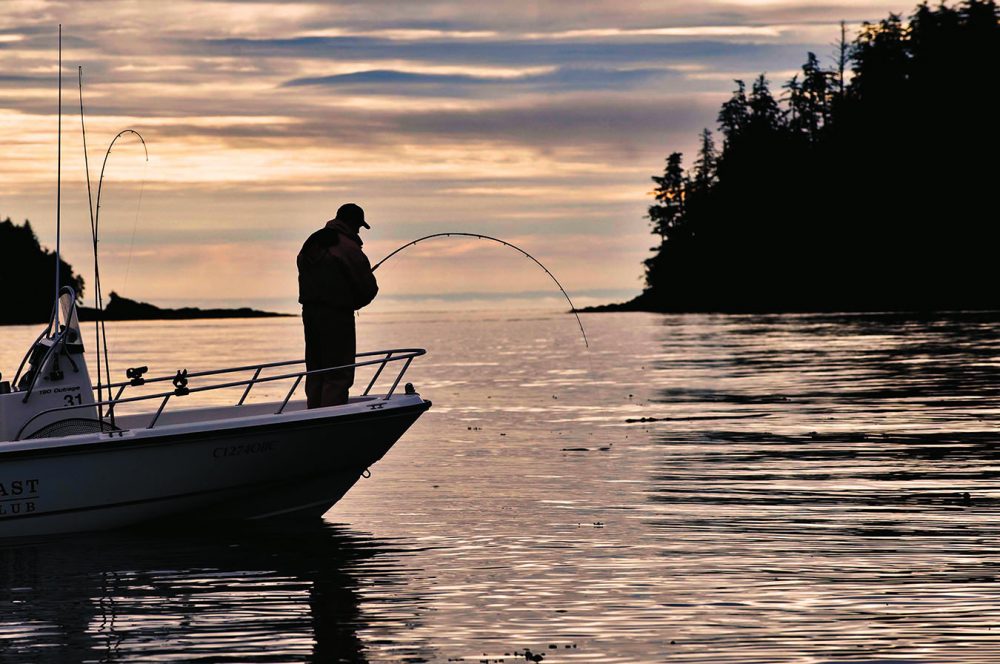When a man tells his wife he is taking off to go salmon fishing with his buddies, there is a distinct image that springs to her mind: she sees her husband contending with the elements on a tin boat, sleeping on a cot in a makeshift shack and living off a steady diet of fish, refried beans and Pilsner. But if these are the conditions he recounts after returning from the West Coast Fishing Club in Haida Gwaii, British Columbia, she should be aware his tales are fabricated.
From the moment you arrive at YVR’s South Terminal, surveying the 40 or so guests with whom you’ll be heading north to Masset, B.C., for the first leg of your journey, immediately you’ll notice that this is a different kind of fishing trip. Yes, the target market is primarily dudes, but they come in the form of distinguished businessmen, professional athletes and semi-recognizable pop stars of yore—not to mention a few of their wives, whose definition of sporting might involve carrying her belongings in designer luggage. But even she will find, later on, that at the hand of proprietors Rick Grange and Brian Legge, salmon fishing isn’t just for blokes.
Back in the 1980s, Torontonians Grange and Legge were partners in security trading looking to take VIP clients fishing in Haida Gwaii. Unimpressed by the lodges that lived up to the stereotype, they decided in 1991 to start a small fishing club of their own. Over the years it has grown to include three lodges in Haida Gwaii, plus another soon-to-open resort in Panama’s Las Perlas Islands off the country’s west coast. Grange acknowledges that “not everyone who comes here wants to go fishing, so we’ve expanded our offering to include horticulture, nature walks, a spa and a great culinary program.” In other words, prepare to be impressed.
Imagine being escorted from Masset, B.C., by helicopter to a remote and private location on Haida Gwaii’s northernmost island, Langara, where you land on a pad adjacent to a handsome lodge perched high on a cliff, overlooking the quiet, pristine Henslung Cove. “Welcome to the Clubhouse,” staff greet guests as they follow along a boardwalk toward the glass-panelled dining room solarium, where Canada’s representative at the 2011 Bocuse d’Or competition, executive chef Ryan Stone, has a hearty brunch prepared and waiting.
After putting a little gas in the tank, guests suit up in Helly Hansen survival gear and head straight to the boats, and then on to the open waters. It’s the perfect location: this particular spot just shy of Alaska is the intersection of several salmon migration routes. It makes catching that elusive chinook all the easier, especially with the assistance of the West Coast Fishing Club’s trusty guides, who will get you all reeled up and raring to go with top-of-the-line equipment. If you do catch a tyee (that’s a chinook over 14 kilograms; which you likely will), the guides encourage you to release the “hog” back into the water. B.C.’s chinook stocks are in need of recovery, so throwing back the big ones helps to maintain a strong gene pool. But don’t worry, you’ll be rewarded for your benevolence with prizes from the Club and have plenty of coho and “fatty flatties” (a.k.a. halibut) to stock your freezer with. (Good cooks know these two are tastier, anyway.)
Even those still not convinced about fishing will find there is plenty to see and do on the islands. Scenery is of course one thing—the majestic Pillar Rock jutting up from Cox Island is a fantastic sight—and wildlife is yet another. From the boats you’ll spot eagles, sea lions, orca and humpbacks, all in an afternoon. Or you can head across the straight to Graham Island to meet the Haida Watchmen of Kiusta who will teach you about the way of their people, as it was 200-and-more years ago. Now grown over with blanket of grass and moss, artifacts found at the ancient village date back roughly 10,000 years, and red cedar totems still rise up from the coastline. Kiusta means “where the trail comes out”, and you can follow that trail through a lush rainforest across Graham Island’s northern peninsula to Lepas Bay. Waves so big you can see them break several kilometres from shore are referred to as “Tofino on steroids” by the fishing guides, but the beauty of it—as the sun casts a pastel haze of fog and cloud across the sky—is enough to make grown fishermen cry. Such is the case for an American visitor in the group, who says, “If there is a place more beautiful than this, God only knows it”.
After long days on or relaxing off the water, you can taste your way across the island through the culinary innovation of chef Stone and friends. On select weekends throughout the summer, he’ll invite a few up to share the kitchen with him. David Hawksworth, Andrea Carlson and Vikram Vij are just a few of the guest chefs who have dazzled guests with their use of local and indigenous ingredients: miniature heirloom tomatoes, foraged chanterelle mushrooms, the freshest seafood available and more. “People come here with big appetites,” says Stone, “and that is the main purpose of our cuisine. But we also try to elevate that. Of course I like to wow the guests, but more importantly, I hope that when they leave the lodge, they’ll leave having learned something about what they’ve eaten, why we are serving tomato salad and how that tomato ended up on their plate.”
That appears to be a part of the overall vision for the Fishing Club—not just sustenance, but sustainability. From protecting the salmon stocks through their catch-and-release program to the positive relationships fostered with the Haida people, helping them preserve their culture and land, to the harvesting of many fresh local ingredients, including those grown right at Rick Grange’s very own Masset, B.C., home, the West Coast Fishing Club has a lot going right. This is something resident golden retriever Chelsea seems to know, as she bounds happily between guests who raise their glasses to the new perspective they’ve gained.












